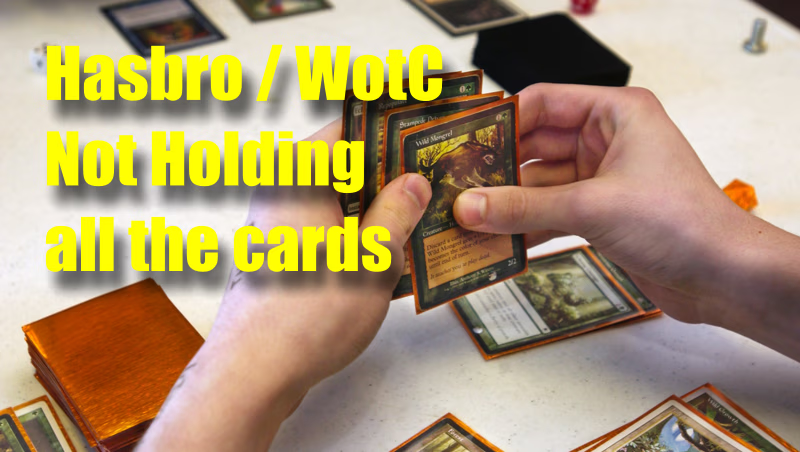Hasbro, the parent company of Magic: The Gathering (MTG) and Dungeons & Dragons (D&D), is facing a lawsuit from shareholders who say the company misled them about its financial health. The lawsuit was filed in New York on behalf of everyone who bought Hasbro stock between February 2022 and October 2023. It’s led by the West Palm Beach Firefighters’ Pension Fund, and they’re trying to recover losses from a sharp drop in Hasbro’s stock price.
So What Happened?
The shareholders claim Hasbro lied about its inventory levels. The company made it seem like rising inventory meant strong future sales. In reality, Hasbro overproduced products like MTG cards, creating a glut that stores couldn’t sell. This led to declining prices for cards and financial struggles for local game shops and collectors. Bank of America even criticized Hasbro for “destroying the long-term value of the MTG brand.”
A big part of the problem was Magic: The Gathering. Hasbro flooded the market with new cards, reprints, and other products, making it hard for collectors and stores to keep up. The oversupply hurt the perceived value of the cards and led to frustration in the MTG community.
The problems started getting real in January 2023, when Hasbro reported a 17% drop in revenue compared to the previous year. The company also announced layoffs of 15% of its workforce and the departure of its Chief Operating Officer. That is news caused Hasbro’s stock to drop by 8%. Later, in October 2023, Hasbro revealed an 18% revenue drop for its Consumer Products division and $50 million in costs tied to clearing out unsold inventory. The stock fell another 11.7% after that.
Dungeons & Dragons Digital Push and Fan Backlash
Hasbro also faced criticism over changes to Dungeons & Dragons. The company tried to modernize D&D by pushing for digital tools and artificial intelligence to help with campaigns and character creation. This clashed with D&D’s long history as a tabletop game, and fans were upset. They felt these changes could hurt the creativity and social aspects of the game.
The biggest uproar came when Hasbro tried to change the Open Gaming License (OGL). This license lets independent creators make content for D&D, which has helped build a strong community around the game. When Hasbro attempted to impose stricter rules and royalties, fans fought back. They organized petitions, canceled subscriptions, and shared their anger online. Hasbro eventually reversed its decision, but the damage to its relationship with fans was done.
What’s Next?
That’s a tough one. It’s unlikely that Hasbro will simply slip beneath the waves. The lawsuit highlights how Hasbro’s efforts to make more money from its games has backfired, with the company apparently placing the importance of short term profits over long term profitability. Trying to mess with the tabletop, in person dynamic of what Dungeons and Dragons is and convert it into a semi-automated online-only experience hasn’t been going as well as they’d like either. Now, shareholders are demanding answers and financial compensation. If they win their suit, Hasbro’s stock tanking even further is one possible outcome.
![]()
SCIFI.radio is listener supported sci-fi geek culture radio, and operates almost exclusively via the generous contributions of our fans via our Patreon campaign. If you like, you can also use our tip jar and send us a little something to help support the many fine creatives that make this station possible.













And there’s another angle to all this. Elon Musk is thinking about buying Hasbro. https://gamerant.com/elon-musk-buy-hasbro-dungeons-and-dragons/
In our opinion, Elon Musk needs to have his toy money pile taken away from him. He clearly isn’t responsible enough to use it properly.